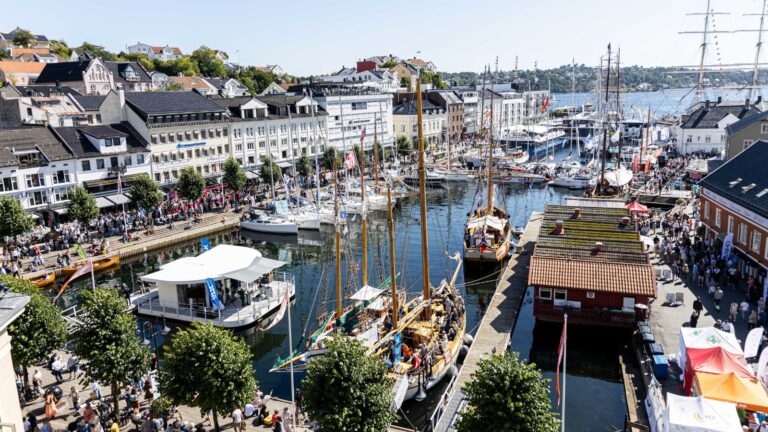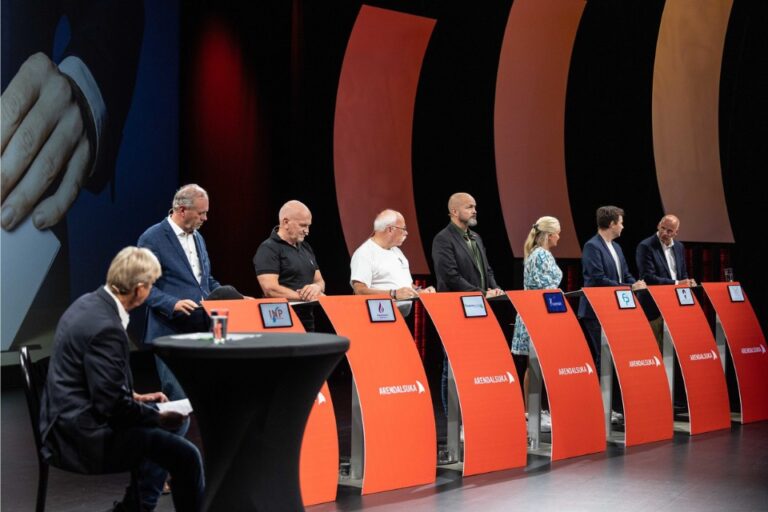Arendalsuka is an annual political event held in Arendal, a small coastal town in southern Norway. Here's what you need to know about the event.
A few years ago, I used to do some work with a research institute here in Trondheim. It was the first time I'd stumbled upon the term ‘Arendalsuka', or ‘Arendal Week' in English.

I'd heard of Arendal the place, but had no idea what it had to do with science or politics, or my role in a communications team. That soon changed!
With this year's event about to kick off (Arendalsuka 2024 runs 12-16 August), I thought it a good time to explain what the event is all about.
The ‘Arendal Week' Explained
Simply put, the annual event serves as a platform where politicians, business leaders, organisations, and the general public can come together to discuss, debate, and shape the future of Norway. In theory, at least.
Since its inception in 2012, Arendalsuka has grown significantly in both size and influence, becoming one of the most important arenas for political dialogue in Norway.
What does that mean in practise? It's a sprawling event with a program of debates, panel discussions, and lectures, which cover a wide array of topics from climate change and healthcare to education, defense, and digitalisation.

These sessions are held in various venues throughout Arendal, including outdoor stages, town halls, and cultural centres, designed to create a festival-like atmosphere. Most are in Norwegian, although a handful are in English.
One of the defining features of Arendalsuka is its attempt at inclusivity. Leading politicians and business leaders attend, but all events are free and open to the public. This open access is a key aspect of the event's mission to enhance democratic participation and transparency.
‘Arendalsuka Ung' consists of several events for children and young people aged from 4 to 19, aimed to promote involvement and paritipcation in society.
In addition to the formal program, Arendalsuka hosts a variety of exhibitions and street stalls where organisations, political parties, and businesses can showcase their work and interact with attendees.
Origins of Arendalsuka
Arendalsuka was conceived as a Norwegian equivalent to Sweden's ‘Almedalen Week', with the goal of fostering open and democratic debate.

The event is designed to bring political processes closer to the people, providing an opportunity for citizens to engage directly with their elected representatives and other key societal actors.
It also serves as a venue for organisations and interest groups to present their views and influence the political agenda.
The choice of Arendal on Norway's southern coast as the host city is significant, as it highlights the importance of regional centres in national political discourse, ensuring that political engagement is not confined to the capital city, Oslo.
Criticisms of Arendalsuka
While Arendalsuka is celebrated as a forum for democratic engagement in Norway, it is not without its criticisms.
Concerns about elite dominance, corporate influence, the quality of debates, environmental impact, and the scale of the event reflect the challenges of maintaining the event's original purpose of fostering inclusive and meaningful dialogue.
One of the most significant criticisms of Arendalsuka is that, despite its inclusive goals, the event tends to be dominated by political elites, large organisations, and corporations.

Critics argue that the event, while technically open to the public, often privileges voices from established political and business circles, which can marginalise smaller organisations, grassroots movements, and ordinary people.
The concern is that the event may reinforce existing power structures rather than challenge them, limiting the diversity of perspectives that are truly heard.
Additionally, while events are technically free and open to everyone, the cost and logistics of attending—such as travel and accommodation—can be prohibitive for some people, particularly those from lower-income backgrounds or remote areas.
The limited hotel rooms in Arendal must be booked a year in advance of the event. Many people stay in Kristiansand, and travel 45 minutes by bus to reach Arendal.
This can create barriers to participation, making it more difficult for the event to genuinely reflect a broad cross-section of Norwegian society.
Some critics have pointed out that Arendalsuka can sometimes be more about political theatre than substantive debate. With so many high-profile politicians in attendance, the event can become a stage for political posturing rather than a venue for meaningful dialogue.
This can lead to a situation where the event becomes more of a “talking shop” than a forum for generating new ideas or finding common ground on pressing issues.
The emphasis on media coverage and public relations can sometimes overshadow the event's original intent to foster in-depth discussions on complex societal challenges.

